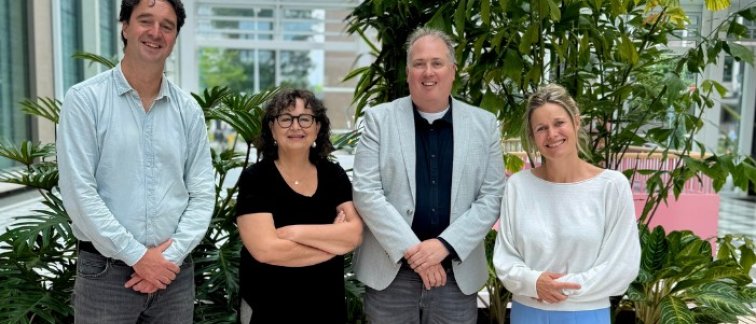Leiden University Medical Center (LUMC) and Amsterdam UMC are launching a six-year clinical study to investigate the efficacy, safety, affordability, and accessibility of CAR-T cell therapy for severe autoimmune diseases (name project: CAR-TB-CURE). The Dutch National Health Care Institute and ZonMw are funding the study with €14.6 million through the Promising Care Subsidy Scheme. The trial will involve patients with systemic lupus erythematosus (SLE), systemic sclerosis, myositis, and myasthenia gravis. Treatments and patient selection will take place at both Amsterdam UMC and LUMC.
Autoimmune diseases affect millions globally, causing chronic and serious health problems. B cells are often responsible, producing antibodies mistakenly attacking the body’s own tissues. Originally developed for blood cancers, CAR-T therapy targets and removes these harmful B cells, potentially resetting the immune system and inducing long-term remission.

Why CAR-T?
CD19-directed CAR-T therapy provides deep and durable B cell depletion, including in tissues such a lymph nodes and bone marrow, which helps eliminate auto-reactive cells that sustain disease. Unlike rituximab, an existing treatment that targets and eliminates B cells, CAR-T cells induce more profound and longer-lasting effects. In patients with autoimmune disease, B cells return after approximately 3–4 months as naïve (reset) cells, while long-lived plasma cells, important for vaccine memory, remain mostly intact.
‘We aim to determine whether hospital-produced CAR-T cells can correct immune system errors. If successful, patients may discontinue medication and achieve drug-free remission. We are testing this in patients for whom standard treatments have failed, while also assessing feasibility and cost-effectiveness for future inclusion in Dutch basic health insurance,’ Prof. Hans Ulrich Scherer (LUMC), lead investigator of the CAR-TB-CURE project.
Research and clinical expertise
Both Amsterdam UMC and LUMC have extensive experience with CAR-T therapy in hemato-oncology, primarily in lymphoma and multiple myeloma. The national CAR-T tumor board has helped build this expertise and ensure patient safety.
- LUMC already produces CAR-T cells in-house and has successfully treated its first SLE patient outside of a research setting.
- Amsterdam UMC is developing similar production capacity in collaboration with Sanquin.
From bench to bedside
The research team will also conduct translational immunology studies to better understand how CAR-T therapy works in B cell–mediated autoimmune diseases. These efforts involve profiling of various immune compartments, including blood, lymph nodes, and bone marrow. ‘This approach may evolve as we gain experience. We aim to identify a therapeutic window for specific patient groups who would benefit most,’ Prof. Tas adds.
The CAR-TB-CURE team welcomes collaboration with researchers within AI&I with relevant knowledge or technological expertise with regards to the translational immunology approach. Interested scientists are encouraged to contact Prof. Sander Tas.
Timeline
- First patient treatment expected: mid 2026
- Follow-up period: 2 years
- Total inclusion period: 3 years
- First results: expected by 2031
Improving accessibility and cost
Currently, there are no approved CAR-T treatments for autoimmune conditions and the cost for commercial CAR-T cancer therapies can exceed €360,000 per patient.
Professor Marie José Kersten (Amsterdam UMC): ‘Academic production can substantially reduce costs, increasing access. We will also use a key component (the lentiviral vector) developed by Hospital Clínic de Barcelona to keep production affordable.’
This research is made possible through close collaboration across the departments of Rheumatology, Hematology, Neurology, and Nephrology at both institutions, as well as Biomedical Data Sciences (LUMC) and Sanquin. The departments of neurology of both hospitals are participating since half of the patient cohort consists of autoimmune muscle diseases.
Dr. Joost Raaphorst (Amsterdam UMC): ‘Early reports from abroad on patients being cured from their very difficult to treat myositis, an autoimmune muscle disease, are highly encouraging and reinforce the need for comprehensive research on a larger scale.’
Research Team
At Amsterdam UMC (top image): Joost Raaphorst, Marie José Kersten, Sander Tas, and Ilse Kuipers.
At LUMC (bottom image): Mirjam Heemskerk, Rosa de Groot, Hendrik Veelken, Tom Huizinga, Joost Vermaat, Jeska de Vries-Bouwstra, Hans Ulrich Scherer, and Wilbert van den Hout.

If you are a researcher with relevant expertise or technologies that could benefit the research team, please contact Prof. Sander Tas.
Read our previous articles about CAR-T cell therapy:
Reprogramming Immunity: A Cheaper, Faster Future for CAR-T Therapy? (July 2025)
CAR-T cell therapy: proven effective for some cancer patients who are out of treatment options (September 2022)

